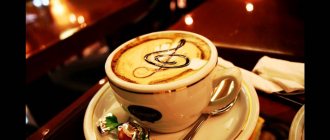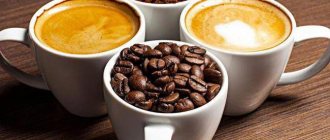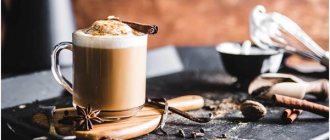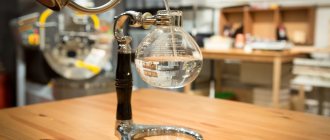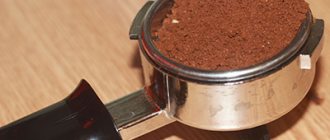Many people love coffee. How nice it is to drink a cup of fragrant, invigorating drink in the morning in silence, even before the start of a new hectic day! However, many have noticed heartburn after coffee, both from natural and instant coffee.
According to the observations of coffee lovers, even a good grain product, expensive, flavored with milk, sometimes causes heartburn. Why is this happening?
How does coffee affect the gastric mucosa?
Coffee itself causes heartburn because the caffeine it contains increases the production of hydrochloric acid. If you treat yourself to a cup or two a day, nothing bad will happen. But if you drink several cups daily, gastritis may develop due to the constant stimulation of the production of large volumes of gastric juice. Hydrochloric acid (the main component of gastric juice) is an extremely aggressive environment; when a lot of it is produced, it damages the gastric mucosa. This is the reason for the frequent occurrence of a burning sensation behind the sternum.
The drink helps relax the sphincter (a muscle valve that prevents food from flowing back from the stomach into the esophagus). When gastric contents with a large amount of gastric secretion are thrown into the esophagus, a burning sensation occurs behind the sternum, in the throat.
Why do you get heartburn after coffee?
Heartburn from coffee occurs in completely healthy people and in those who suffer from gastritis and stomach ulcers. Let's consider two options - the effect of grain and instant drinks on the stomach. And let’s look at the reasons for the burning sensation behind the sternum in both cases.
Grain
Bean coffee should be preferred to instant coffee in almost any situation. It does not contain additives saturated with harmful substances (dyes, preservatives), which add to the coffee lover’s likelihood of developing heartburn. Coffee beans are the basis of the drink, for the preparation of which the raw materials are pre-processed, or, as they also say, roasted. The procedure allows you to partially destroy the components that enhance the production of gastric juice.
These include:
- caffeine;
- catechols.
During the roasting process, grains lose some of the substances harmful to the stomach.
At the same time, during processing, another component is activated - N-methylpyridium, which limits the ability of stomach cells to produce a lot of acid. Therefore, lovers of natural grain coffee are less likely to complain of heartburn - for them this condition is not so acute or appears after drinking coffee from over-roasted beans (roasting itself contributes to the development of a hyperacid state).
Soluble
Instant coffee lovers have a higher risk of developing heartburn. The reasons are as follows:
- the product is often prepared from cheap raw materials;
- poorly processed or over-processed;
- they add dyes and fragrances to hide the fact that the product is of low quality.
Low-grade robusta (a coffee plant that produces grains for making instant powder) contains many substances that irritate the walls of the stomach. Manufacturers often give preference to low-grade robusta, and this is easily explained: the plant is unpretentious, is grown without special expenses, and production is cheaper.
Important!
Low-grade Robusta instant coffee contains twice as much caffeine, which can cause stomach problems! Those who want to indulge in some coffee and save money at the same time should know about this.
The influence of other components of coffee
Why else can coffee cause heartburn? To understand the reasons, it’s worth remembering what you like to drink it with.
Usually combined with it:
- sugar;
- milk;
- cinnamon;
- cream;
- lemon;
- cognac.
As for sugar, this product can cause heartburn even without coffee. Sweet foods increase the secretion of hydrochloric acid.
An unpleasant effect can be obtained if you drink a cup of coffee with milk in the morning before breakfast or simply during the day on an empty stomach, as a snack. The feeling of fullness and vigor will come quickly. However, it is possible that heartburn will appear along with them, since coffee and sugar enhance each other’s effects.
Not everyone can irritate the stomach walls with milk. It is often used to dull a burning sensation behind the sternum. But with frequent use of milk, you can get the opposite of the expected result: in response to relieving heartburn with milk, the body will begin to produce more hydrochloric acid after a while, and the burning sensation in the chest will be repeated. The same goes for cream. Milk and cream in combination with coffee can cause a burning sensation.
Cinnamon, like any spice, stimulates the appetite, and therefore stimulates the natural production of hydrochloric acid.
Lemon contains plenty of acid; people with gastritis or stomach ulcers should consume the fruit with extreme caution, and when combined with coffee, lemon can be dangerous. Drinking can provoke an exacerbation of diseases.
Cognac, like any alcohol, irritates the walls of the stomach and esophagus. You should not experiment by combining coffee and cognac on an empty stomach.
Diseases of the gastrointestinal tract
Heartburn after coffee is a symptom that is noted by those suffering from diseases of the gastrointestinal tract. Sometimes this happens in patients with hypoacid gastritis, but much more often in those diagnosed with hyperacid gastritis.
People with signs of inflammation of the stomach, esophagus, or duodenum should not drink coffee on an empty stomach, especially with chocolate or chocolate candy. Even during the period of remission, it is better to drink a small cup after lunch or breakfast, when there is food in the stomach. The hydrochloric acid that is released is used to process food, and does not “eat” the walls of the stomach.
What to do if coffee causes heartburn
If instant coffee without sugar, drunk on a full stomach, causes heartburn, and this happens constantly, you need to watch yourself. Have you noticed occasional nausea, periodic stomach pain, heartburn not only from coffee, but also from other foods? Go see a gastroenterologist. It makes sense to check if any disease of the gastrointestinal tract has appeared.
If everything is fine, but you can’t get rid of heartburn, try changing your eating habits. The following helps get rid of the burning sensation:
- Eat first.
- Drink weak and only natural grain coffee.
- After enjoying a cup of drink, you should not immediately take a horizontal position. You need to stay in a horizontal position for 40 minutes.
What can you eat for heartburn?
Preventing discomfort from tea
Most fans of the tonic and refreshing drink drink it 3-5 times a day and are unlikely to be able to give it up, even if a burning sensation in the esophagus begins to bother them.
However, there are several ways to improve your well-being and prevent serious complications:
- give up strong leaf tea - a weakly brewed drink is more favorably accepted by the stomach;
- give preference to natural varieties, leafy ones - and green or black tea is not so important, in terms of the amount of tannin and caffeine they are almost equal;
- It is advisable to conduct the tea ceremony not on a full stomach - it is better to take the drink after the main course, after 40–50 minutes;
- reduce the amount of sweets to a minimum - either do not put sugar in tea at all, or no more than 1 spoon, and cakes and custard pies can be replaced with a simple sandwich or salted crackers.
It is important to observe the temperature regime - the best option is a warm drink of about 45–50 degrees. This will prevent additional tissue injury.
Why does coffee cause heartburn in pregnant women?
During gestation, heartburn occurs not only from coffee, but also from other products.
The reason is that the fetus is growing, the uterus is enlarging, moving neighboring organs, putting pressure on the stomach. Therefore, during pregnancy, heartburn from coffee, chocolate and other foods appears more often. In order to reduce the risk of unpleasant sensations, you should give up instant coffee and 3-in-1 drinks and try to drink natural coffee little by little, always after meals. Sugar, lemon, and spices should not be added to the drink.
Other causes of dyspepsia
Heartburn from tea is not always directly related to the consumption of the drink. Other factors may also affect the activity of the digestive structures:
- the strength of the brewed concentrate - the leaf form is more difficult to control, the risk of making the drink too rich is quite high;
- low quality of raw materials - especially in the form in bags, they may contain other additives, for example, mud dust;
- a large amount of sugar added to the mug - it has an additional irritating effect on the gastric mucosa.
All of the above factors do not immediately provoke disorders in the digestive system. Heartburn after tea is the result of many years of habit of pampering yourself with a strong, sweet tonic drink. And purchasing expensive varieties in a store does not at all guarantee high quality products. Additional impurities may be present in raw materials even from trusted suppliers. It is better to switch to the loose form of tea and learn how to prepare the drink correctly to reduce the negative effects of tannin and caffeine on the stomach.
How to make a drink softer
You may have heartburn from coffee, but you can’t give up your favorite drink that immediately lifts your mood?
Let's look at how we can mitigate these manifestations so that we can still enjoy ourselves without suffering the consequences.
You can do the following:
- try decaffeinated coffee;
- buy dark roasted coffee, it contains less aggressive substances;
- drink a drink brewed using the “cold” method.
You can do something even more radical - switch to chicory. Brewed chicory is very tasty and perfectly invigorating.
The main rule is that moderation is important in everything. If you love coffee, please drink it infrequently and in small cups, brew it lightly and without adding sugar. And after coffee gatherings, be sure to go for a walk.
Let coffee bring you only pleasure, not heartburn!
How to get rid of unpleasant symptoms
Unpleasant sensations that appear systematically in the epigastric region are a reason to contact a medical facility. It is quite possible that their appearance is not due to coffee drinks, but to the onset of a pathological process. The invigorating liquid helps to worsen the situation.
Provided that the burning sensation occurs only when drinking coffee, the following recommendations will help get rid of the unpleasant symptoms:
- reduce the number of servings consumed per day to the bare minimum;
- add dairy products to the composition;
- stop drinking an invigorating drink on an empty stomach;
- Do not drink coffee immediately after meals. You need to wait at least half an hour;
- do not add sugar;
- Excessively hot coffee causes maximum harm;
- Do not include citrus fruits.
Pharmacies dispense a lot of medications that help eliminate symptoms. The following are especially popular:
- Ranitidine;
- Gaviscon;
- Gevikson;
- Maalox.
Coffee drinks can cause heartburn. You can reduce the negative impact with the help of simple recommendations. If such symptoms are observed systematically, medical help is needed.


